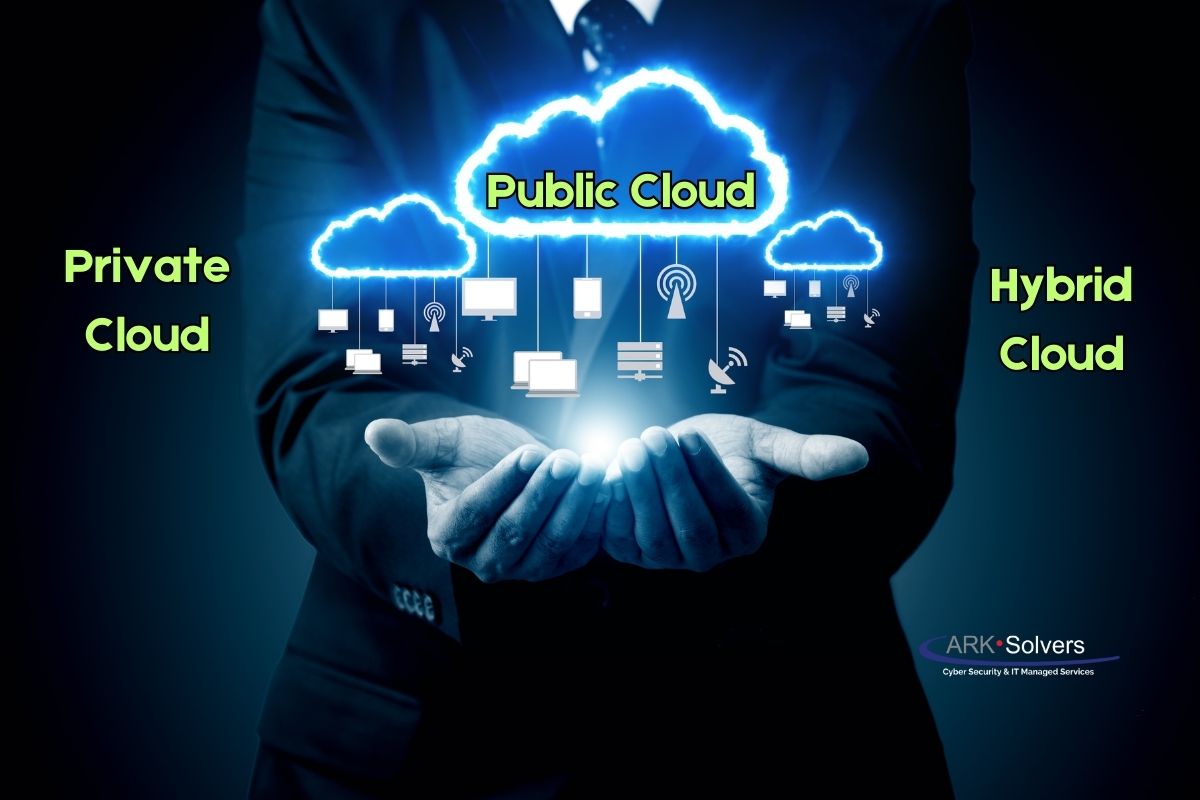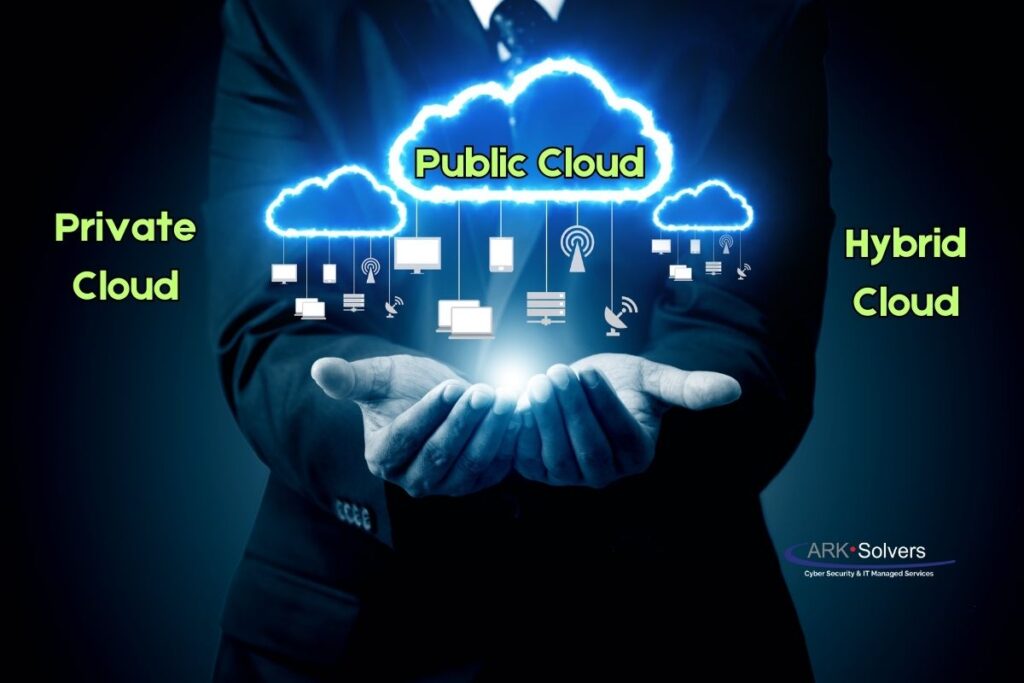Public Cloud vs Private Cloud vs Hybrid Cloud

Public Cloud vs Private Cloud vs Hybrid Cloud
In today’s digital world, the cloud service is vital for businesses. Companies need help choosing between public, private, or hybrid cloud models. Ark Solvers is here to help you understand these options and choose the best for your business.
Which cloud model is right for your business? Do you know the main differences between public, private, and hybrid clouds and how they affect your operations? Let’s explore cloud computing together. We’ll look at the pros and cons of each model to help you make an intelligent choice for your organization.
Key Takeaways
- Understand the fundamental differences between public, private, and hybrid cloud computing models.
- Explore the benefits and challenges associated with each cloud deployment option
- Discover how to choose the right cloud solution to support your business goals and IT infrastructure.
- Learn about the importance of cloud security, scalability, and cost management in your cloud strategy.
- Gain insights into the evolving cloud computing landscape and emerging trends.

Introduction to Cloud Computing Models
Cloud computing has changed how we use digital resources. At Ark Solvers, we know how important it is to understand the different cloud models. Each model has its benefits and things to consider. Let’s explore the leading models: public, private, and hybrid.
What is Cloud Computing?
Cloud computing lets users access digital resources over the Internet. Instead of using local devices, users can access resources online, making computing more flexible and scalable.
Read More: What is Cloud Computing? Types, Examples, and Benefits
Understanding Cloud Deployment Models
The three main cloud models are:
- Public Cloud: A public cloud is shared by many users. It’s owned by a third-party provider like Amazon Web Services (AWS) or Microsoft Azure. Users pay for what they use.
- Private Cloud: A private cloud is for one organization. It’s hosted on-premises or in a private data center. It offers more control and customization.
- Hybrid Cloud: A hybrid cloud combines public and private clouds. It lets organizations use the best of both worlds. They can run some workloads in the public cloud and keep sensitive data in a private cloud.
Knowing these models is key to making smart cloud choices. It helps organizations decide what’s best for their needs, such as security, scalability, and cost.
Public Cloud: The Shared Infrastructure
The public cloud model is a top choice for companies looking for scalable and affordable computing. Ark Solvers, a leading cloud services provider, knows the pros and cons of public cloud computing.
This model uses a shared infrastructure. It pools computing resources for many organizations over the Internet, making it a great option for businesses of all sizes.
Scalability and Flexibility
One big plus of the public cloud is its scalability. Ark Solvers’ public cloud lets businesses grow or shrink their resources as needed. This is super helpful for companies with changing demands or unpredictable workloads.
Cost-Effectiveness
As Ark Solvers offers, public cloud computing is often cheaper than having your data center. It saves money on hardware, software, and IT staff, which leads to significant cost savings for organizations.
Read More: What is the Average Cost of Cloud Service?
Ease of Deployment
Ark Solvers’ public cloud solutions are easy to use and deploy. This makes it simple for businesses to get their apps and services online quickly, helping them get to market quicker and work more efficiently.
However, the public cloud also has its challenges. Security and data sovereignty are big concerns. Ark Solvers tackles these by using strong security and offering data residency options, which ensures they meet regulatory needs.
In summary, as Ark Solvers shows, the public cloud is a strong choice for companies. It offers scalable, affordable, and easy-to-use computing resources. By understanding the public cloud’s benefits and challenges, businesses can make intelligent choices for their cloud strategies.
Private Cloud: The Dedicated Environment
The cloud computing world is growing, and private clouds are becoming more popular. They give organizations more control and security and meet their specific needs. Unlike public clouds, private clouds are not shared with others.
Benefits of a Private Cloud
Private clouds have many benefits. They let businesses customize their cloud setup to fit their needs. This is great for companies that need to follow strict rules, as private clouds offer better data protection.
They also provide better security because they are not shared. This means there is less chance of data breaches or unauthorized access.
Challenges of a Private Cloud
However, private clouds have their challenges. They can be expensive to set up and maintain. Companies need skilled IT staff to handle the private cloud, which costs a lot.
Private clouds might also not be as flexible or scalable as public clouds. This is because they’re limited to a company’s own resources.
Ark Solvers, a top cloud computing service, knows the private cloud’s pros and cons. “For companies wanting more control, security, and to follow rules, private clouds are a good choice,” says Emily Gonzalez, their cloud architect. “But, it’s important to think about the good and bad sides to make sure it fits the company’s needs and budget.”
Read More: How Is Cloud Computing Used In Everyday Life?
Hybrid Cloud: The Best of Both Worlds
Businesses are now using hybrid cloud solutions to maximize the use of public and private clouds. Ark Solvers, a top cloud computing provider, sees the value in this mix. It combines the strengths of both clouds, giving companies the flexibility and cost savings they need to succeed.
Advantages of a Hybrid Cloud
Ark Solvers’ experts highlight several benefits of a hybrid cloud:
- Increased Flexibility: Hybrid clouds let businesses quickly move workloads between public and private clouds. This flexibility meets their specific needs.
- Enhanced Scalability: The hybrid model allows companies to adjust their computing resources as needed, ensuring they use resources wisely and save on costs.
- Improved Data Security and Compliance: Sensitive data stays in the private cloud, while less critical data is on the public cloud. This keeps businesses in line with regulations.
- Optimized Costs: Hybrid clouds help reduce cloud spending. They use the public cloud for non-essential tasks and the private cloud for critical ones.
Ark Solvers’ clients have seen significant benefits from using a hybrid cloud. They’ve tailored their cloud setup to fit their business needs. This has helped them innovate and grow in their industries.
Read More: Discover the Key Benefits of Cloud Computing Today
Public Cloud vs Private Cloud vs Hybrid Cloud
Ark Solvers examines the main differences between public, private, and hybrid clouds. This helps businesses choose the right one for their needs. Each cloud type has its benefits and suits different companies.
The public cloud is a shared space run by a third party. It’s cost-effective and grows with your needs. A private cloud is just for one company, giving more control and customization. A hybrid cloud mixes public and private, letting businesses use the best of both.
Ark Solvers suggests considering security, rules, growth, and cost when picking a cloud. A public cloud is suitable for companies with changing needs and a need for quick resources. A private cloud is best for strict data rules. A hybrid cloud balances needs and uses both cloud types’ strengths.
Choosing between public, private, or hybrid cloud depends on your company’s needs and goals. Ark Solvers is ready to guide you through the cloud options and find the best fit for your business.
Cloud Security Considerations
Businesses are moving quickly to cloud computing. At Ark Solvers, we know how vital it is to protect your data. We’ll look at the main cloud security points and discuss how to keep your cloud data safe.
Data Protection and Compliance
Protecting your data is a big concern with cloud services. Cloud security means using strong access controls, encrypting data, and having good backup plans. Depending on your business type, following industry rules like HIPAA, GDPR, or PCI-DSS is also vital.
Ark Solvers suggests these cloud security and compliance tips:
- Use multi-factor authentication to guard your cloud access
- Encrypt data at rest and in transit with top encryption methods
- Back up your cloud data often and test your disaster recovery plans
- Keep detailed audit logs to watch and track user actions
- Make sure your cloud provider’s security and compliance meet your industry needs
Putting cloud security and compliance first helps keep your data safe. Ark Solvers is here to guide you through cloud security and set up robust protection for your needs.
Read More: What is the 3 Tier Model in the Cloud?
Cloud Scalability and Flexibility
At Ark Solvers, we know cloud computing is more than just on-demand computing power. Its scalability and flexibility are key, and these features can change the game for any size organization.
Cloud scalability lets businesses quickly adjust their computing needs. This is crucial for handling sudden spikes in traffic or new projects. The cloud makes it simple to scale up or down as needed.
This agility keeps organizations competitive in the fast-changing digital world. It helps them stay responsive and ahead of the game.
The cloud flexibility lets companies try new tech and adapt to market changes easily. They can quickly deploy new apps, test different setups, and change strategies without significant upfront costs. This way, they can optimize cloud cost considerations while staying innovative.
At Ark Solvers, we team up with our clients to meet their unique needs. We help them use cloud scalability and flexibility to their advantage. Our cloud solutions make businesses more agile, efficient, and forward-thinking.
If you want to scale your infrastructure, start new digital projects, or cut cloud costs, Ark Solvers is here to help. Contact us to see how our cloud expertise can help your business thrive.
Read More: Is AWS or Google Cloud More Popular?
Cloud Cost Management Strategies
At Ark Solvers, we know managing cloud costs is critical for all businesses. As more companies move to the cloud, sound strategies are vital. These help keep cloud spending low and deployments cost-effective.
Cost Optimization in the Cloud
Cost optimization is a significant part of cloud cost management. It means examining how cloud resources are used, finding ways to save, and taking action. By monitoring cloud costs and making smart choices, businesses can save a lot and better control their cloud spending.
Our team at Ark Solvers helps clients with cloud cost optimization. We focus on monitoring costs, managing resources, and planning cloud migrations. Using advanced analytics and best practices, we help our clients save on cloud costs, allowing them to focus on their main business goals without worrying about high cloud expenses.
FAQ
What is the difference between public, private, and hybrid clouds?
A public cloud means shared computing resources are shared over the Internet. A private cloud is a dedicated setup for one organization. Hybrid cloud mixes both, offering benefits from each.
What are the benefits of using a public cloud?
Public clouds are scalable, cost-effective, and easy to start. They offer quick access to resources with little initial cost. Yet, they might worry about data security and where it’s stored.
What are the advantages of a private cloud?
Private clouds give more control and better security and allow strict rules to be met. They’re customized for your needs. But, they cost more upfront and need IT skills to manage.
How does a hybrid cloud solution work?
A hybrid cloud uses both public and private clouds. It lets you move workloads based on need, achieving scalability, cost savings, and control.
What are the key security considerations for cloud computing?
Cloud security is vital. It’s about protecting data, following rules, and managing who can access it. You must check your provider’s security and follow best practices like encryption and identity management.
How can organizations optimize their cloud costs?
To manage cloud costs, watch your usage, adjust resources, and use cost-saving options. Also, cost tracking and chargeback models should be set up. This helps keep cloud expenses in check.


